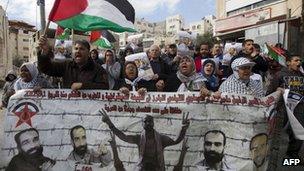Protest in West Bank for Palestinian hunger strikers
- Published

Protests have been held in the West Bank in solidarity with Palestinian hunger strikers in Israeli jails.
The Middle East Quartet (UN, US, EU and Russia) has recently issued warnings about the condition of the strikers.
The EU's foreign policy chief Catherine Ashton said she was "following with concern" the deteriorating health of four Palestinian hunger strikers.
One, Samer Issawi, has been on an intermittent protest for 200 days and is said to be in a critical condition.
The three other hunger strikers are Tariq Qaadan, Jafar Ezzedine and Ayman Sharawna.
On Monday, Israeli forces dispersed several dozen protesters in Bethlehem who had blocked a road.
In Ramallah, the administrative centre of the West Bank, about 50 activists demonstrated at a United Nations office, the Associated Press reported.
Mukid Abu Atwan, the Director General of Palestinian Prisoners' Ministry, told the BBC that the hunger strikers should be released immediately.
"We want to tell Israelis and the rest of the world that we won't accept for Palestinian prisoners to come out of jail in coffins. They deserve to be free and live a dignified life," he said.
The hunger strikers and their supporters say they are being unfairly held.
A spokesperson for Israel's Prisons Service said the four prisoners were in "satisfactory condition" and receiving medical treatment as needed, but they had lost the right to family visits when they began their protests.
'Administrative detention'
As of December 2012, Israel held 4,517 Palestinians in its jails.
Of these 1,031 are being held until the conclusion of legal proceedings, 178 are in administrative detention (without charge or trial) and 170 are under 18 years of age.
The issue of prisoners is an emotive one for Palestinians, who view many of those incarcerated as heroes of the conflict with Israel.
On Saturday the EU called on Israel to "[fully respect] international human rights obligations towards all Palestinian detainees and prisoners".
Middle East Quartet envoy Tony Blair expressed concern about the "the deteriorating health condition of the four prisoners".
Earlier in the week, the UN expressed concern for the hunger strikers and called on Israel to end its practice of administrative detention.
This is a system under which a military court can order suspects to be detained indefinitely, subject to renewal every six months by the court, without trial or charge. The Israeli military says it uses administrative detention when it fears an immediate risk to security or to protect informants.
Two of the detainees, Ayman Sharawna and Samer Issawi, were released in October 2011 as part of a prisoner exchange deal that led to the freeing by Hamas of captured Israeli soldier Gilad Shalit.
Mr Sharawna and Mr Issawi were both later re-arrested by the Israeli authorities for allegedly violating the terms of their release.
Mr Sharawna been on hunger strike since July, except for a brief break in January. Mr Issawi launched a hunger strike in August, but the the BBC understands that at points during the 200 odd days he has broken off his hunger strike for short periods only to resume it again.
Mr Ezzedin and Mr Qaadan, who are being held under administrative detention, have been on hunger strike since November. According to the Israeli campaign group Physicians for Human Rights both men are taking in only water and refusing medical treatment or food supplements, such as vitamins and minerals.
On 10 February they were transferred to a hospital and treated by doctors against their wishes, the group says.